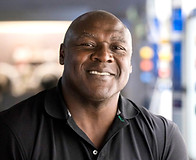
News
The University of Alabama has recognized Dr. Gregory H. Robinson as a Graduate Centennial Scholar, which honors the top 100 graduate school alumni who continue to bring distinction to the Capstone and their academic programs through their many professional accomplishments. Read more here.
Professor Robinson was recently featured in a ChemistryWorld article titled "In situ with Gregory Robinson." In this article, he discusses his experience attending a segregated school in Alabama, playing football while pursuing a degree in chemistry, as well as some of his experiences and interests outside of academia. Read more here.


In our most recent publication, we describe the synthesis, molecular structure, spectral, and computations of a stable aluminum-based tris(dithiolene) triradical, which represents the first structurally characterized tris(dithiolene) triradical complex. (DOI: 10.1021/jacs.4c05631).

Professor Robinson was recently featured in a UGA Research article titled "Q&A: Robinson wrestles with chemistry's grand challenges." In this article, he discusses his research interests and pivotal discoveries, including the concept of metalloaromaticity. Read more here.

In this article, we report the dual nucleophilic reactivity of the carbon backbone of the N-heterocyclic silyl framework and the terminal sulfur atom of the dithiolene unit in a dithiolene-based N-heterocyclic silane towards boron halides. This discovery is a unique example of Lewis acid-induced charge separation of a five-membered N-heterocyclic silyl ring. (DOI: 10.1039/d3dt03843b).

3
2
This publication has been awarded the front cover of Organometallics. This article describes that carbene-stabilized dithiolene zwitterion can activate the B–H bonds of BH via hydride-coupled reverse electron transfer (HCRET) processes. This conclusion is supported by both experimental and theoretical data. (DOI: 10.1021/acs.organomet.3c00361)
3
In this article (published online: 6 March 2023), a JACS Perspective, we review seminal advances in the chemistry of carbene complexes containing main group element cores in the formal oxidation state of zero, including their diverse synthetic strategies, unusual bonding and structural motifs, and utility in transition metal coordination chemistry and activation of small molecules. (DOI: 10.1021/jacs.2c13574).

On 6 March 2023, Professor Robinson presented a seminar titled "From N-Heterocyclic Carbenes to Dithiolene Radicals: A counterintuitive Trek Through Main Group Chemistry" at the Inorganic-Electrochemistry Seminar held at the California Institute of Technology.

Professor Robinson was recently awarded the prestigious Bailar Medal by the Department of Chemistry of the University of Illinois at Urbana-Champaigne. The Bailar Medal recognized Professor Robinson’s numerous contributions to inorganic and main group chemistry. Professor Robinson presented a series of lectures at UIUC .

ChemistryViews discusses our recent discovery of ammonia activation by a carbene-stabilized dithiolene zwitterion in this article. The bifunctional system composed of a dithiolene and a carbene may result in unusual applications for small-molecule activation.

In this publication, we describe that carbene-stabilized dithiolene zwitterion can activate ammonia via single-electron transfer (SET) and hydrogen atom transfer (HAT) processes. This conclusion is supported by both experimental and theoretical data. This discovery is the first example of metal-free ammonia activation via HAT. (DOI: 10.1021/jacs.2c07920).

-
Phuong Tran Earns Two Awards: Outstanding Graduate Student of the Year and Martin Reynolds Smith Award
Congratulations to Phuong Tran for being awarded the 2021 Northeast Georgia Section of the ACS award for 'Outstanding Graduate Student of the Year' and the 2022 Martin Reynolds Smith Award for a graduate student in the Department of Chemistry who published the best research paper in a refereed journal during the year of 2021.

In this article, we report the cleavage of sulfur-sulfur bonds in an imidazole-based dithione dimer by both cyclic(alkyl)(amino)carbene and N-heterocyclic carbene to give the first carbene-stabilized dithiolene zwitterions. (DOI: 10.1002/anie.202108498).

In this article, we describe the synthesis, molecular structure, electron paramagnetic resonance (EPR) and computations of the first group 2 element-based dithiolene radical. (DOI: 10.1021/acs.organomet.1c00607).

Dr. Gregory H. Robinson has received the prestigious honor of being elected to the National Academy of Sciences. This is one of the highest honors a scientist can earn. The National Academy of Sciences is a private, nonprofit institution that was established under a congressional charter signed by President Abraham Lincoln in 1863. It recognizes achievement in science by election to membership and — with the National Academy of Engineering and the National Academy of Medicine — provides science, engineering, and health policy advice to the federal government and other organizations.

-
Dr. Yuzhong Wang wins Chemist of the Year for Research
Congratulations to Dr. Yuzhong Wang for being awarded the 2020 NorthEast Georgia Section of the American Chemical Society for 'Chemist of the Year for Research.'
.jpeg)
In honor of Black History Month, the ACS is “highlighting noteworthy African American chemists working today, engaging them in conversation about their life and work".

In this article, we describe the synthesis, molecular structure, and computations of the first structurally characterized germanium tris(dithiolene)dianion. Our study suggests that
carbene-mediated partial hydrolysis may represent a new method to access tris(dithiolene) complexes of main-group elements. (DOI: 10.1039/D0CC08206F)

Dr. Robinson was featured in a Columns article for his efforts to increase the diversity of STEM faculty at UGA. Read more here.

In this publication, we report the synthesis, molecular structure, and computations of the first “naked” dithiolene radical anion and we report its ability to ring-open tetrahydrofuran in a synergic fashion (DOI: 10.1021/jacs.0c08495).


Our article published in JACS explores the concept of a novel means to activate molecular nitrogen using bipyridine and a molecule containing a boron-boron bond (DOI: 10.1021/jacs.0c00409).
-
Katie Luedecke Commits to Cal Tech
Congratulations and best wishes to Katie Luedecke who has committed to the California Institute of Technology to pursue her graduate studies in the fall. We wish Katie much success in her future endeavors!

-
Katie Luedecke Awarded NSF Graduate Research Fellowship
Congratulations to Katie Luedecke on being awarded a Graduate Research Fellowship from the National Science Foundation! This fellowship provides financial support during graduate studies. Read more about the fellowship here.


Our article was published in Angewandte Chemie (DOI 10.1002anie/201916395R).

This article was published in Organometallics.

Dr. Robinson was featured on the UGA homepage for his efforts to increase the diversity of STEM faculty at UGA. UGA recently joined the Aspire Alliance Institutional Change Network, funded by the National Science Foundation, to encourage more diversity in STEM research and education. Read more here.
-
Katie Presents at GCURS
Undergraduate Katie presented her research on boron-based carbene complexes at Rice University at the Gulf Coast Undergraduate Research Symposium on November 2, 2019.

-
Welcome New Graduate Student!
Welcome Phuong Tran (University of North Georgia '19) to our group!

Katie Luedecke was featured in the August 25th issue of UGAToday as a UGA Amazing Student!
Dr. Robinson was duly elected a full member of Sigma Xi: The Scientific Research Honor Society for his devotion to the promotion of research in science.

Congratulations to Katie Luedecke for winning the 2019 Barry Goldwater Scholarship! The scholarship is awarded based on research experience in the natural sciences, mathematics, and engineering.

Dr. Robinson was selected to discuss the most exciting and challenging aspects of developing inorganic chemistry research in Nature Chemistry's 10 year anniversary edition. See what he has to say on page 290!

Dr. Robinson's research success is highlighted in the Summer 2018 edition of Georgia Magazine.

This article in Angewandte Chemie has been designated as a ‘Hot Paper’ (DOI: 10.1002/anie.201804298). This article concerns our recent efforts to explore the chemistry of N-heterocyclic carbene-based dithiolene radicals.

On May 4, 2018, Dr. Hunter Hickox graduated from the University of Georgia with a Ph.D. in Chemistry. He was one of eighteen to receive a Ph.D. from the Department of Chemistry, and the most recent graduate from the Robinson Research Group.
Hunter looks forward to a new job in New York! Starting in June 2018, Hunter will work with ICL, a global manufacturer of specialized chemical products.

-
Katie Luedecke Selected for Inorganic Undergraduate Symposium Workshop
Katie, an Undergraduate Research Assistant, was recently selected to participate in the Inorganic Undergraduate Symposium Workshop at the Fall 2018 Meeting of the American Chemical Society in Boston, MA. Katie was one of fifteen students selected to meet with distinguished researchers from around the nation, give a poster presentation, and learn key techniques to apply to graduate school.

-
Dr. Gregory H. Robinson Featured in UGA Promotional Video
The University of Georgia highlights Dr. Robinson's research and teaching successes and discusses his personal story in this promotional video for the university.
-
Hunter Hickox Successfully Defends His Dissertation
On Monday, March 26 2018, senior graduate student Hunter Hickox obtained his Ph.D. in Chemistry after successfully defending his dissertation to his committee, Dr. Tina Salguero, Dr. Henry F. Schaefer III, and Dr. Gregory H. Robinson.

Undergraduate Research Assistant Katie Luedecke was named a Foundation Fellow Spring of 2018. This premier scholarship is awarded for academic performance, leadership, and public service.

Dr. Gregory H. Robinson's profile was highlighted in the University of Georgia's 2017 President's Annual Report. Access the entire report here.

Dr. Gregory H. Robinson has received the tremendous honor of being named a Fellow of the Royal Society of Chemistry in 2017. Learn more about the largest organization in Europe that encourages the advancement of chemistry here.

Congratulations to Katie Luedecke and Samantha Benevides for being awarded the 2017 Northeast Georgia Section of the ACS award for 'Outstanding Undergraduate Student of the Year.'

Chemical and Engineering News highlights the first phosphaphosphenium cation, a novel discovery from this laboratory.

-
Dr. Yuzhong Wang wins Chemist of the Year for Research

Congratulations to Dr. Yuzhong Wang for being awarded the 2016 Northeast Georgia Section of the American Chemical Society of the ACS award for 'Chemist of the Year for Research.'
These results featuring carbene-stabilization of molecular silicon oxide moieties have been featured in Chemistry World. The article, "Soluble Sands Boost Silicon Synthesis," discusses our laboratory's synthetic success regarding disilicon molecules.

Chemistry & Engineering News highlights the fundamental discovery of the synthesis of Si2O3 and Si2O4, executed in this laboratory. Further, silicon-based electronic applications are discussed in this article.

A UGA Today article suggests that the synthesis of silicon oxides opens a "new world in a grain of sand."
Previously thought impossible, the isolation of P2O4 by this laboratory was discussed in the article, "First Route to Diphosphorus Tetroxide."

Dr. Gregory H. Robinson wins the 2013 F. Albert Cotton Award in Synthetic Inorganic Chemistry.

Chemistry & Engineering News discusses the recent discovery of a dicarbene in this article. A combination of an abnormal NHC and a traditional NHC, this dicarbene synthesized in this laboratory could increase the utility of NHCs.

This laboratory's recent discovery of carbene-stabilizes Si(0) compound is a fundamental breakthrough in silicon chemistry.

Chemistry & Engineering News reveals that due to discoveries like this laboratory's Ga6 cage compound, aromaticity may no longer have the prerequisite of being carbon- based.

Backed by calculations, the unexpected boron-boron double bond in a compound synthesized in this laboratory makes it the first neutral and stable diborene.

Dr. Robinson's research successes and his athletic background are discussed in a Georgia Magazine article.

Chemistry & Engineering News highlights a chemical bonding controversy.

Chemistry & Engineering News reports the first organometallic compound of its kind.

On December 13, 2024, Dr. Phuong Tran graduated from the University of Georgia with a Ph.D. in Chemistry. She is the most recent graduate from the Robinson Research Group, and was the co-author of 12 publications during her studies.


